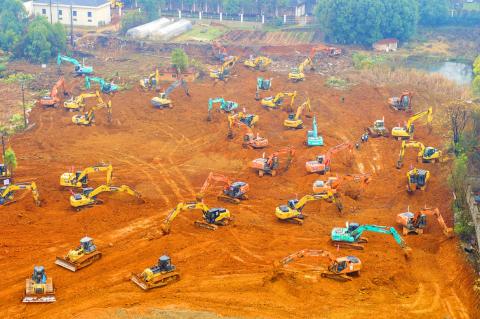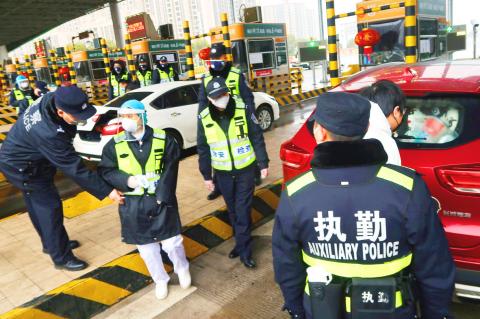Chinese authorities yesterday expanded their mammoth quarantine effort to 13 cities and a staggering 41 million people, as nervous residents were checked for fevers and the death toll from the 2019 novel coronavirus (2019-nCoV) climbed to 26.
A range of Lunar New Year festivities have been canceled, while temporary closures of Beijing’s Forbidden City, Shanghai Disneyland and a section of the Great Wall were announced.
The WHO said China faced a national emergency, but stopped short of making a declaration that would have prompted greater global cooperation, including possible trade and travel restrictions.

Photo: AP / Chinatopix
With hundreds of millions of people on the move across China for the Lunar New Year holiday, the government has halted all travel out of Wuhan, shut down its public transport and told residents to stay at home.
Normally bustling streets, malls and other public spaces were eerily quiet in Wuhan on the second day of its lockdown.
Masks were mandatory in public, and images from the city showed empty shelves as people stocked up for what could be an extended isolation.

Photo: Reuters
Train stations, the airport and subways were closed; police checked incoming vehicles, but did not entirely close off roads.
Hospitals visited by journalists bustled with worried patients being screened by staff wearing full-body protective suits.
At a temperature-check station, a medical staffer in bodysuit, mask and goggles took a thermometer from a middle-aged woman, pausing to examine the reading before quickly turning back to the patient.
“Have you registered? Then go and see the doctor,” the staffer said.
One 35-year-old man surnamed Li voiced the fears of many.
“I have a fever and cough, so I’m worried that I’m infected,” he said. “I don’t know the results yet.”
A taxi driver in Wuhan, who asked not to be named, said: “This year we have a very scary Chinese New Year. People are not going outside because of the virus.”
However, a prolonged shutdown should not pose food-shortage problems because many people had stocked up for the holiday, he said.
In addition to Wuhan, 12 other smaller cities nearby have battened down the hatches, with most of them going public yesterday with various measures ranging from closing public venues and restricting large gatherings, to halting public transportation and asking citizens not to leave their cities.
As reports surfaced of bed shortages in Wuhan hospitals, state media said authorities were rushing to build a new facility devoted to the outbreak by Feb 3.
It is to have a capacity of 1,000 beds spread over 25,000m2, Xinhua news agency said.
Dozens of excavators and trucks were filmed working on the site by state television.
Xiaotangshan Hospital was erected on the outskirts of Beijing in barely a week in 2003 to cater to a rapidly rising number of SARS patients.
It consisted of prefabricated structures and Xinhua said Wuhan was building the new facility based on the same model.
China Central Television reported that 40 medical doctors from the military were being brought in to help with intensive care at Wuhan Pulmonary Hospital.
Chinese authorities said the number of cases leapt overnight to more than 800, with 177 in serious condition. There were another 1,072 suspected cases.
Officials also said that a virus patient died in Heilongjiang Province, the second death outside Wuhan.
Beijing has canceled popular New Year public events at temples in the capital, the historic Forbidden City is to close from today, and Shanghai Disneyland said it would also shut today for an indefinite period to protect visitors and staff.
To discourage travel, the government has said all tickets for rail, air, road or water transport could be exchanged for a refund.

A Ministry of Foreign Affairs official yesterday said that a delegation that visited China for an APEC meeting did not receive any kind of treatment that downgraded Taiwan’s sovereignty. Department of International Organizations Director-General Jonathan Sun (孫儉元) said that he and a group of ministry officials visited Shenzhen, China, to attend the APEC Informal Senior Officials’ Meeting last month. The trip went “smoothly and safely” for all Taiwanese delegates, as the Chinese side arranged the trip in accordance with long-standing practices, Sun said at the ministry’s weekly briefing. The Taiwanese group did not encounter any political suppression, he said. Sun made the remarks when

The Taiwanese passport ranked 33rd in a global listing of passports by convenience this month, rising three places from last month’s ranking, but matching its position in January last year. The Henley Passport Index, an international ranking of passports by the number of designations its holder can travel to without a visa, showed that the Taiwan passport enables holders to travel to 139 countries and territories without a visa. Singapore’s passport was ranked the most powerful with visa-free access to 192 destinations out of 227, according to the index published on Tuesday by UK-based migration investment consultancy firm Henley and Partners. Japan’s and

BROAD AGREEMENT: The two are nearing a trade deal to reduce Taiwan’s tariff to 15% and a commitment for TSMC to build five more fabs, a ‘New York Times’ report said Taiwan and the US have reached a broad consensus on a trade deal, the Executive Yuan’s Office of Trade Negotiations said yesterday, after a report said that Washington is set to reduce Taiwan’s tariff rate to 15 percent. The New York Times on Monday reported that the two nations are nearing a trade deal to reduce Taiwan’s tariff rate to 15 percent and commit Taiwan Semiconductor Manufacturing Co (TSMC, 台積電) to building at least five more facilities in the US. “The agreement, which has been under negotiation for months, is being legally scrubbed and could be announced this month,” the paper said,

MIXED SOURCING: While Taiwan is expanding domestic production, it also sources munitions overseas, as some, like M855 rounds, are cheaper than locally made ones Taiwan and the US plan to jointly produce 155mm artillery shells, as the munition is in high demand due to the Ukraine-Russia war and should be useful in Taiwan’s self-defense, Armaments Bureau Director-General Lieutenant General Lin Wen-hsiang (林文祥) told lawmakers in Taipei yesterday. Lin was responding to questions about Taiwan’s partnership with allies in producing munitions at a meeting of the legislature’s Foreign Affairs and National Defense Committee. Given the intense demand for 155mm artillery shells in Ukraine’s defense against the Russian invasion, and in light of Taiwan’s own defensive needs, Taipei and Washington plan to jointly produce 155mm shells, said Lin,